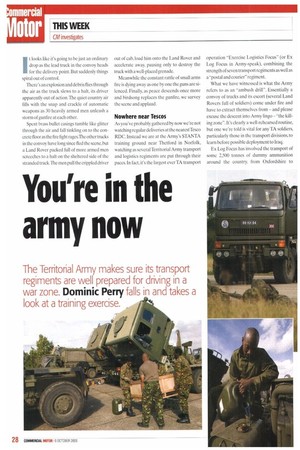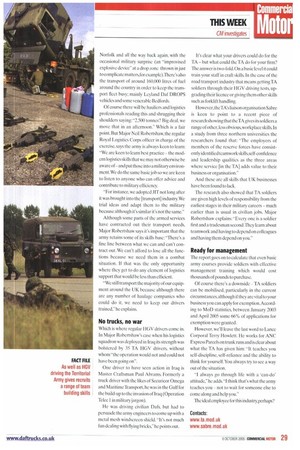You're in the army now
Page 28

Page 29

If you've noticed an error in this article please click here to report it so we can fix it.
The Territorial Army makes sure its transport regiments are well prepared for driving in a war zone. Dominic Perry falls in and takes a look at a training exercise.
It looks like it's going to be just an ordinary drop as the lead truck in the convoy heads for the delivery point. But suddenly things spiral out of control.
There's an explosion and debris flies through the air as the truck slews to a halt, its driver apparently out of action. The quiet country air fills with the snap and crackle of automatic weapons as 30 heavily armed men unleash a storm of gunfire at each other.
Spent brass bullet casings tumble like glitter through the air and fall tinkling on to the concrete floor as the fire fight rages.The other trucks in the convoy have long since fled the scene, but a Land Rover packed full of more armed men screeches to a halt on the sheltered side of the stranded truck. The men pull the crippled driver out of cab, load him onto the Land Rover and accelerate away, pausing only to destroy the truck with a well-placed grenade.
Meanwhile the constant rattle of small arms fire is dying away as one by one the guns are silenced. Finally, as peace descends once more and birdsong replaces the gunfire, we survey the scene and applaud.
Nowhere near Tescos
As y ou've probably gathered by now we're not watching regular deliveries at the nearest Tesco RDC. Instead we are at the Army's STANTA training ground near Thetford in Norfolk, watching as several Territorial Army transport and logistics regiments are put through their paces. In fact, it's the largest ever TA transport operation -Exercise Logistics Focus" (or Ex Log Focus in Army-speak), combining the strength of seven transport regiments as well as a "postal and courier" regiment.
What we have witnessed is what the Army refers to as an "ambush drill". Essentially a convoy of trucks and its escort (several Land Rovers full of soldiers) come under fire and have to extract themselves from and please excuse the descent into Army lingothe killing zone". It's clearly a well-rehearsed routine, but one we're told is vital for any TA soldiers, particularly those in the transport divisions, to learn before possible deployment to Iraq.
Ex Log Focus has involved the transport of some 2,500 tonnes of dummy ammunition around the country, from Oxfordshire to Norfolk and all the way back again, with the occasional military surprise (an -improvised explosive device" at a drop zone thrown in just to complicate matters,for example ).There's also the transport of around 160.0N) litres of fuel around the country in order to keep the transport fleet busy; mainly Leyland Dal DROPS vehicles and some venerable Bedfords.
Of course there will be hauliers and logistics professionals reading this and shrugging their shoulders saying: "2,500 tonnes? Big deal, we move that in an afternoon." Which is a fair point. But Major Neil Rohertshaw, the regular Royal I.ogistics Corps officer in charge of the exercise, says the army is always keen to learn: "We are keen to learn best practice the modem logistics skills that we may not otherwise be aware of-and put those into a military environment. We do the same basic job so we are keen to listen to anyone who can offer advice and contribute to military efficiency.
"For instance, we adopted J IT not long after it was brought into the [transport] industry. We trial ideas and adapt them to the military because although it's similar it's not the same."
Although some parts of the armed services have contracted out their transport needs, Major Robertshaw says it's important that the army retains some of its skills base: "There's a fine line between what we can and can't contract out. We can't afford to lose all the functions because we need them in a combat situation. If that was the only opportunity where they get to do any element of logistics support that would he less than efficient.
"We still transport the majority of our equipment around the UK because although there are any number of haulage companies who could do it, we need to keep our drivers trained," he explains.
No trucks, no war
Which is where regular HGV drivers come in. In Major Robertshaw's case when his logistics squadron was deployed in Iraq its strength was bolstered by 35 TA HGV drivers, without whom -the operation would not and could not have been going on".
One driver to have seen action in Iraq is Master Craftsman Paul Abrams. Formerly a truck driver with the likes of Securicor Omega and Maritime Transport, he was in the Gulf for the build-up to the invasion of Iraq (Operation Telec 1 in military jargon).
He was driving civilian Dafs, but had to persuade the army engineers to come up with a metal mesh windscreen shield. "It's not much fun dealing with flying bricks," he points out. It's clear what your drivers could do for the TA but what could the TA do for your firm? The answer is two-fold. On a basic level it could train your staff in craft skills. In the case of the road transport industry that means getting TA soldiers through their HGV driving tests, upgrading their licence or giving them other skills such as forklift handling.
However, theTA's liaison organisation Sabre is keen to point to a recent piece of research showing that the TA gives its soldiers a range of other, less obvious, workplace skills, In a study from three northern universities the researchers found that: "The employers of members of the reserve forces have consistently identified teamwork skills,self-confidence and leadership qualities as the three areas where service [in the TA] adds value to their business or organisation."
And these are all skills that UK businesses have been found to lack.
The research also showed that TA soldiers are given high levels of responsibility from the earliest stages in their military careers much earlier than is usual in civilian jobs. Major Robertshaw explains: "Every one is a soldier first and a tradesman second.They learn about teamwork and having to depend on colleagues and having them depend on you."
Ready for management
The report goes on to calculate that even basic army courses provide soldiers with effective management training which would cost thousands of pounds to purchase.
Of course there's a downside TA soldiers can be mobilised, particularly in the current circumstances, although if they are vital to your business you can apply for exemption. According to MoD statistics, between January 2003 and April 2005 some 66% of applications for exemption were granted.
However, we'll leave the last word to Lance Corporal Terry Howlett. He works for ANC Express Parcels on trunk runs and is clear about what the TA has given him: "It teaches you self-discipline, self-reliance and the ability to think for yourself. You always try to see a way out of the situation.
'I always go through life with a 'can-do' attitude," he adds."l think that's what the army teaches you not to wait for someone else to come along and help you."
The ideal employee for this industry, perhaps?
Contacts: www.ta.mod.uk www.sabre.mod.uk










































































































































































































